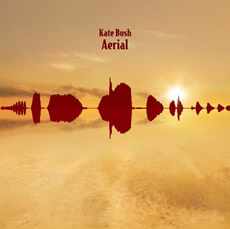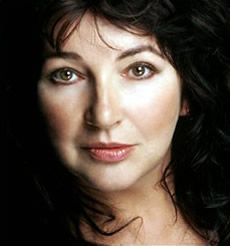|
(20 November 2005) Kate Bush has long been the quintessential reference of female vocalist enthusiasts. So when the news of her first album in over a dozen years arrived earlier this year, it created a frenzy among her fans, female music lovers and critics alike. The double album, entitled Aerial (Columbia (USA) 82796 97772 2, 2005) was released almost simultaneously in England and America on 21 and 22 November 2005. A two-track single entitled "King Of The Mountain" was released as a teaser on 24 October 2005 with a b-side cover of Marvin Gaye's hit "Sexual Healing." Critics have regularly invoked Bush's distinctive soprano voice and the lush, ethereal style she introduced back in 1978 with the single "Wuthering Heights" in describing other quirky alt-pop darlings such as Bjork and Tori Amos. This list of musicians who have cited Bush as a source of inspiration is even more diverse and include featured artist Charlotte Martin. "People lhave made very nice comments," notes Bush, now 48. "And my friends have been telling me for years how they hear my influence. That's the best thing you can ask for." But Bush admits that she herself "doesn't listen to a lot of contemporary music. That's quite deliberately so when I'm working on a record myself." And despite her decade-plus disappearance, Kate Bush has indeed been working lately. She describes two-CD set, Aerial as part concept album, part straightforward song collection. The decision to record two separate discs stemmed from her 1993 release The Red Shoes. The discs are titled A Sea Of Honey and A Sky Of Honey respectively, the second disc being a conceptual piece with a bird theme. In hindsight, I think my last record was too long," Bush says. "Some of my better songs were on it, but they got lost I was trying to give people as much for their money as I could. But people have very short attention spans now. It seems everything is just a moment away from the fast-forward button." While Kate Bush had planned to take some time after The Red Shoes, the path to Aerial provded longer than anticipated. "Since I was 17, I had been just making records and promoting them. I wanted a break. I spent more time with friends, went to see movies, just got on with my life. I thought at first I would take a year off, but it turned into a very long gap." Part of the reason for that was the namesake of the song on Sea entitled "Bertie," Kate's 7-year old son by her longtime partner, guitarist Danny MacIntosh. "I have a little boy, and I wanted to spend a lot of time with him," she says heartfully. Pressed to elaborate on the joys of motherhood, she reveals, "I have to watch myself because I could talk about him all day." She continues, "I don't have as much time now because I've got other things to think about. We've got a lot going on based around where we live, and we don't want to disrupt that." Twelve years is a long wait and in some senses there's no way that Kate Bush’s new double album Aerial was ever going to match the extremely high expectations of many of her fans. Reviewing Kate Bush has always been difficult--she's unique, so comparisons are impossible, except in the sense that next to just about everybody else, she shines. Perhaps the best way is to try and evaluate how Aerial stands up with her other work. A Sea Of Honey opens with the excellent "King Of The Mountain" with its, slow, loping, unemphasised, reggae rhythm. As a single it stands out in the current charts as a beacon of invention, intelligence and musicality. But then we’d expect that from Ms Bush. Unfortunately though, the album doesn’t actually get any better than the opening track. Throughout the 1980s Kate Bush was known for being an incredible innovator. Her brother, Paddy had a unique fascination with ethnic instruments and her association with Pete Gabriel meant she was among the vanguard of mainstream musicians to experiment with world beats, and she thought nothing of slamming a pipe solo into an otherwise fairly conventional prog/rock track ("Night Of The Swallow") or using the close Eastern European harmonies of the Trio Bulgarka instead of the bog-standard female rock trio backing singers. She was also an early perpetrator of immensely full and powerful multi-rhythm percussion tracks ("Sat In Your Lap"). One of the most disappointing aspects of Aerial is that it contains virtually no innovation at all, unless you count the mercifully brief appearances of Rolf Harris on A Sky Of Honey. Play Aerial back to back with most of of her previous work and it clearly lacks flair and bravura. This also throws up another difference, most of the songs fail to develop in any meaningful way. They start and then continue in the same vein until they end--and this is bought into even sharper relief by the fact that the tracks are also generally longer than on previous albums--and in most cases far too long to be sustained by the musical ideas they contain. There's also a distinct lack of memorable melodies. "Prelude," the opening to A Sky Of Honey, is a short piece that sets up a lovely atmosphere. The first couple of minutes of "Prologue" that follows also show enough to make one hopeful that 20 years on, a second "Ninth Wave" might be unfolding. It's a false dawn since "Prologue" wanders along for almost six minutes completely losing its attraction before Rolf's first appearance. There are fleeting glimpses of brilliance in "Sunset," but "Somewhere In Between" was viewed horrible with an unbelievably irritating drum track by one reviewer and the best song of the album by another. It is the split opinions on the material that will likely set this album apart from all of Kate's prior albums. Just to confound, it's only when we get to the final two tracks, the two longest on the set, that you suddenly realise how much better Aerial might have been. "Nocturn" has a beautiful feel to it and perhaps the mesmeric opening vocal melody was a result of Kate having listened to an awful lot of albums by Bjork. The track develops slowly but powerfully, with some wonderful harmonies and some exquisite acoustic guitar soloing back in the mix. There's a sense of build rather than the meandering that has been so predominant till this point. The closing and title track "Aerial" opens with some minimalist string sounds reminiscent of composers such as Philip Glass and Steve Reich. The powerful repetitive rhythm, when it's announced, brings a tension to the music that's been lacking over the previous hour. There's a middle section which features a duet between a twittering bird and Kate Bush laughing manically over the string pattern established in the opening. It's wonderfully mysterious and captivating and weird. And again the final build is extraordinary, some searing electric guitar and a chorus of "ha ha ha ha." It's blistering, disturbing and energising all at the same time, inspiring one reviewer and driving one of the others crazy. When she's in this mode there’s no-one who can touch her. Perhaps the only problem with these closing tracks is that they throw into sharp relief just how pale and insipid is so much of what has gone before.  One of our reviewers thought the album is worth acquiring for the last two tracks alone and considering anything else the new listener likes purely a bonus. One of our reviewers thought the album is worth acquiring for the last two tracks alone and considering anything else the new listener likes purely a bonus. In the great scheme of things any Kate Bush album is something to be thankful for and cherished. This is not a bad album by any stretch of the imagination, and opinions of it  vary widely, but dare we say it that after waiting twelve years for it, some will think there's a pervading feeling of an artist marking time.--Jamie Field in Hereford, England and Russ Elliot in New York vary widely, but dare we say it that after waiting twelve years for it, some will think there's a pervading feeling of an artist marking time.--Jamie Field in Hereford, England and Russ Elliot in New York 
|








